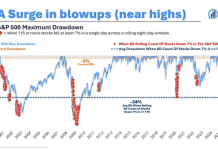It’s good to be the king!
Microsoft (MSFT), the World’s Largest Software company, reported strong growth in its fiscal first-quarter 2024 results last night, beating analysts’ expectations and lifting the mood of the market. The company’s revenue rose by 13% year over year to $56.5 billion, and its earnings per share increased by 21% to $2.69. The main driver of Microsoft’s performance was, of course, its cloud business, which accounted for more than half of its total revenue and grew by 24% to $31.8 billion – up 26% from last year with gross margins now 73%.
Azure now boasts a larger revenue base than Amazon Web Services (AWS) – $22.9Bn vs $21.8Bn for AMZN!
The key factors behind Microsoft’s cloud success was its strategic partnership with OpenAI (ChatGPT) and we can’t really call it love when MSFT paid $10Bn for the relationship but MSFT is getting their money’s worth as both ChatGPT and Bing (also ChatGPT) are hosted on Azure – Microsoft’s Cloud Platform.
 The fruits of this alliance are very sweet indeed: Microsoft is deploying OpenAI’s shiny toys across its consumer and enterprise suites, birthing novel digital experiences. Along with the Azure explosion, there is GitHub Copilot, empowered by Codex, an AI wizard that conjures code from mere whispers of natural language. And let’s not forget Microsoft Designer, which leverages DALL·E 2 to manifest images from natural language captions.
The fruits of this alliance are very sweet indeed: Microsoft is deploying OpenAI’s shiny toys across its consumer and enterprise suites, birthing novel digital experiences. Along with the Azure explosion, there is GitHub Copilot, empowered by Codex, an AI wizard that conjures code from mere whispers of natural language. And let’s not forget Microsoft Designer, which leverages DALL·E 2 to manifest images from natural language captions.
Satya Nadella, Microsoft’s CEO, remains committed to having the leading the AI platform crusade, milking every ounce of value from their digital spend on the OpenAI. MSFT is perfectly leveraging their market dominance with AI innovation, which will soon become integral on the office platform, which already generates $45Bn in revenues for MSFT.
Word, Teams, Excel, Outlook and PowerPoint – Copilot will help users write and design better, visualize maps and charts in Excel, and streamline their inbox. Copilot will also leverage OpenAI’s technology to generate content from natural language instructions, such as creating a summary of a long document or a catchy headline for a blog post.
 By adding AI capabilities to its Office apps, Microsoft proposes to unleash the creativity and productivity of its users and help them achieve more with less effort. This will also increase the value proposition of its Office products and services, and potentially attract more customers and revenue. According to some analysts, Microsoft’s AI investments could boost its earnings per share by 10% in 2024. This would translate into an additional $6.5 billion of net income for the company.
By adding AI capabilities to its Office apps, Microsoft proposes to unleash the creativity and productivity of its users and help them achieve more with less effort. This will also increase the value proposition of its Office products and services, and potentially attract more customers and revenue. According to some analysts, Microsoft’s AI investments could boost its earnings per share by 10% in 2024. This would translate into an additional $6.5 billion of net income for the company.
Microsoft’s strategy of having paid $10 billion to OpenAI has tied ChatGPT to its cloud service, which has now grown to become two-thirds of its revenue growth. Moreover, Microsoft is also using OpenAI’s technology to enhance its Office suite of applications, which is its largest revenue source by product. This could give Microsoft a significant competitive advantage in the software market and drive its future growth and profitability – well played Satya!
While MSFT soared through the clouds, Google (GOOG/L) is stuck in a quagmire. GOOG/L posted a modest revenue increase of 6% year over year to $65.1Bn, yet the figures fell short of the Wall Street’s expectations of $66.4Bn. A miss of $1.3Bn (1.95%) might not seem like much in the grand scheme of things BUT, in the earnings world, it’s a worrying sign to investors – especially when they’ve been expecting AI miracles. Earnings per share also disappointed at $1.12 versus the anticipated $1.15.
Even worse, the culprit was a SLOWDOWN in its Cloud and AI segments, which, by the way, are supposed to be its turbo engines into the future of tech dominion. Google Cloud’s revenue did grow by 22.5% year over year to a sweet $8.41Bn, but someone hit the brakes, decelerating from the 29% growth we saw in the previous quarter. And, to add a bit of salt to the wound, Google Cloud reported an operating loss of $1.24Bn, even wider than the $1.19Bn loss a year ago.
Google’s AI business encompasses Search, YouTube, and Advertising. Despite a 7% year over year surge to $35.8Bn in Search and other revenues and YouTube’s ad revenue climbing 16% to $7.2 billion, the pace has slackened from the preceding quarter. The trio of AI offerings Bard, Duet, and Dall-E, couldn’t whip up the magic against Microsoft/OpenAI’s team of Copilot, Designer, and ChatGPT. I have noted to our Members that Bard is essentially useless compared to the other AI offerings and the result has been a lackluster show of Revenue and User Engagement.
 It comes down to the stark contrast in the narrative of Innovation and Investment between the two Tech Titans. While Microsoft was wooing OpenAI with a $10Bn serenade, Google’s $1Bn seemed more like a casual date. The exclusivity of Microsoft’s embrace with OpenAI’s tech led to a bouquet of AI-powered offerings, leaving Google’s incremental tweaks to its AI suite looking like mere daisies among roses.
It comes down to the stark contrast in the narrative of Innovation and Investment between the two Tech Titans. While Microsoft was wooing OpenAI with a $10Bn serenade, Google’s $1Bn seemed more like a casual date. The exclusivity of Microsoft’s embrace with OpenAI’s tech led to a bouquet of AI-powered offerings, leaving Google’s incremental tweaks to its AI suite looking like mere daisies among roses.
Gartner’s tells us that Microsoft’s share of the global cloud infrastructure services market bloomed from 18% in Q3 2022 to 20% in Q3 2023, while Google’s share flatlined at 9%. IDC shows Microsoft’s share of the global AI software platforms market blossomed from 22% to 25% and it came straight from Google as their market share shrunk from 21% to 19%. This is playing out exactly as we thought it would from the moment MSFT announced their investment in ChatGPT.
We hear from Facebook (META) and IBM (IBM) this evening and it will be interesting to see how that plays out. I will be on Bloomberg’s Money Talk this evening where we’ll be focusing on broad market issues, our Money Talk Portfolio and Salvage Plays but do go back to March 3rd and hear what we had to say at the dawn of the AI Age.
Interested in joining? You will gain access to our portfolio, live chat, and other member exclusive perks!
Email Admin@philstockworld.com for a seven day free trial at sign up.







